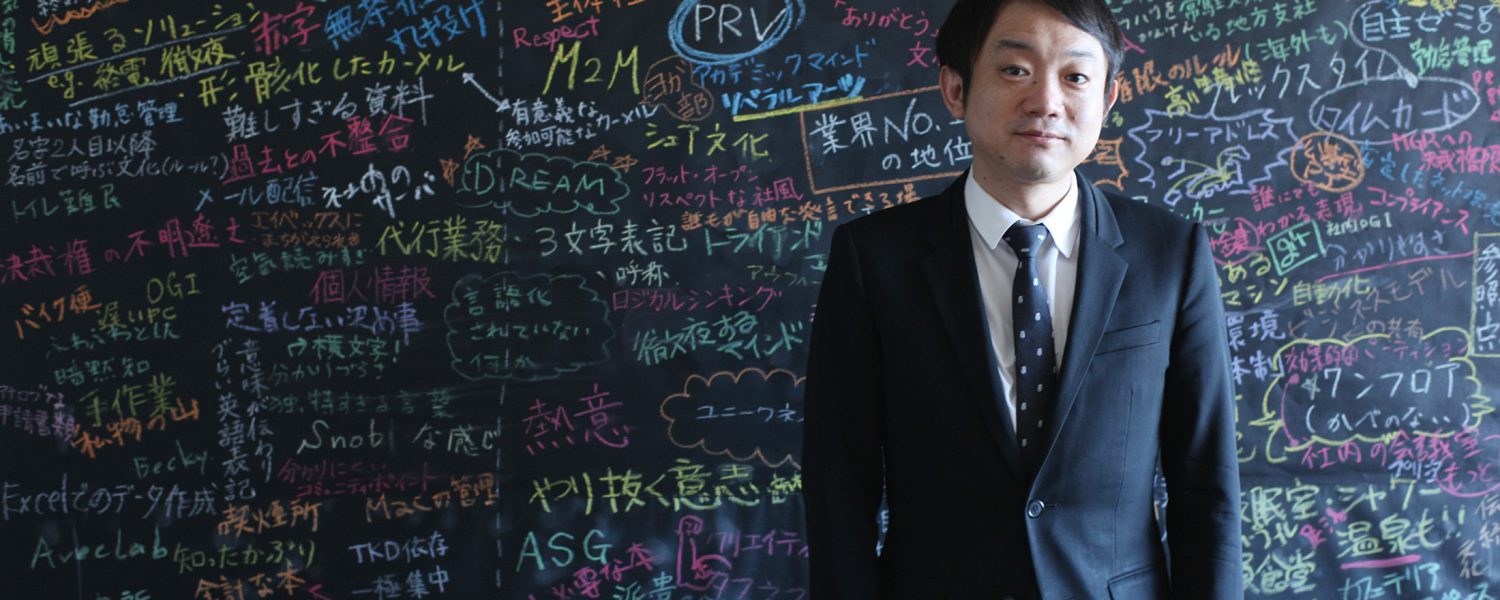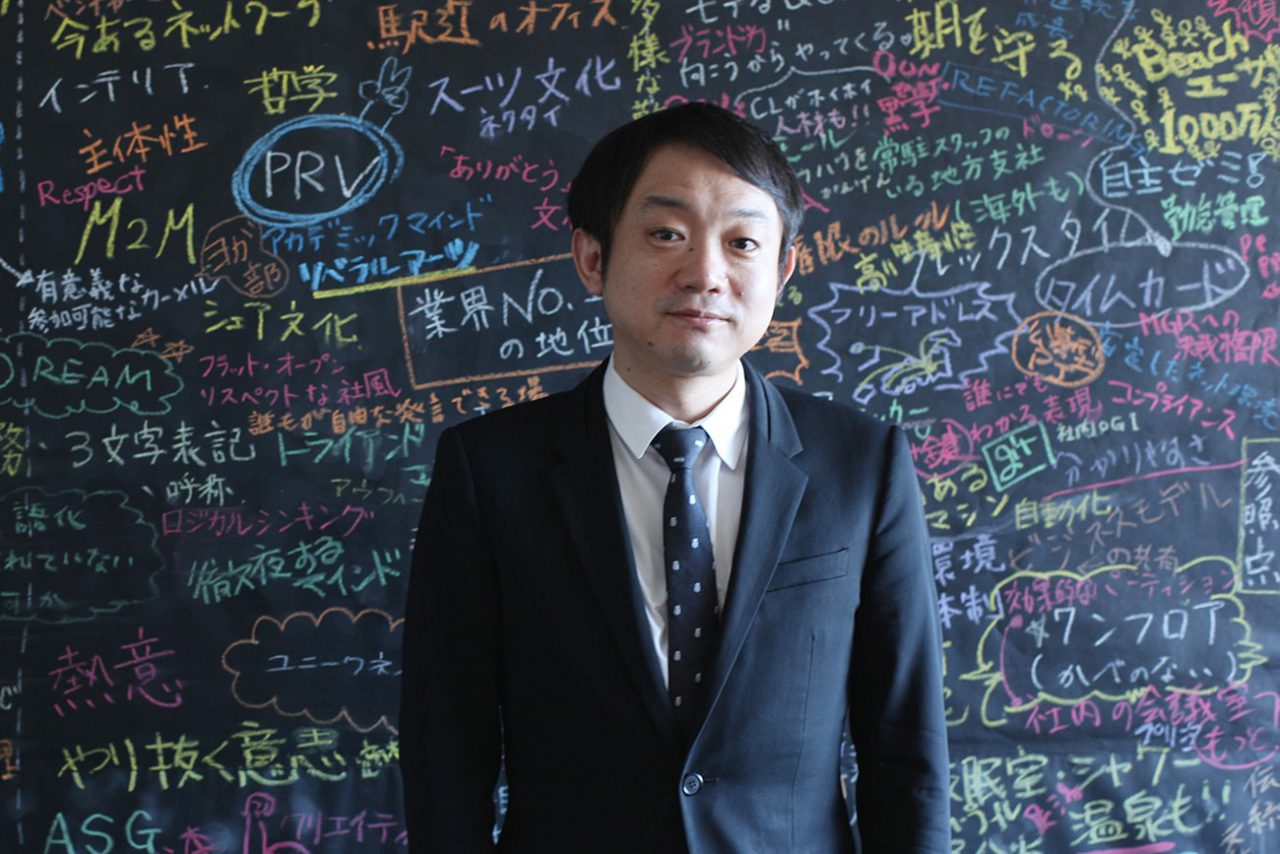
人々と企業がさらに“つながる”未来のために
インターネット本来の可能性に魅せられて人々と企業をつなぐ「消費者コミュニティ」の開発に取り組んできたクオン株式会社。
慶應義塾大学の研究者たちとともに思い描くすべての人がつながる未来のビジョンと、その実現に懸ける想いとは。
企業と人々をつなぐ「コミュニティ」のビジョン
弊社は、企業各社の顧客をオンライン上に集めて、その場を活性化させ、ファンを増やしていく「消費者コミュニティ」を作り出し、企業と顧客とをつなぐ支援を行っています。 創業は1996年、私が日本大学芸術学部に在学中のことでした。「エイベック研究所」という社名で、2000年までに大企業のサイトをはじめ、130ものサイト構築を手がけました。その一方で、当初からインターネットの持つインタラクティブ(双方向)な性質と、人々が直接つながるネットワークの可能性を最大限に活かすことのできるサービスを実現したいと考えていました。「オンラインコミュニティ」という呼び名のもと、いまで言うソーシャルメディアのような発想で、既存の経済原理とはまったく違う世界を切り拓いていくんだという意気込みでしたね。
このビジョンの実現に向けて、当初はサイト構築で得た資金で開発を続け、2000年にはシステムの設計図ができあがり、会社も株式会社化を果たしました。ところが問題は、その事業化に向けたビジネスモデルがなかったこと。インターネットの本質的な価値観は旧来の経済構造とは対立すると考えていたため、投資家の方からの広告掲載の申し出も頑なに断っていたのです。
そんな中で、あるベンチャーキャピタルの方の助言を得て導き出したのが、企業と消費者との双方向のつながりを支援するというコンセプト。必ずできるはずだという確信だけを手がかりに、前例もノウハウもないオンラインコミュニティの実現に向けて、手探りで実践を積み重ねていきました。
2003年頃には、10万人規模のコミュニティが実現し、さまざまな企業から「コミュニティを作りたい」という依頼が少しずつ増えていきました。しかし、コミュニティができあがったところで、それをどうやって活性化させればいいのかがわからない。ノウハウをゼロから構築していくために、慶應義塾大学湘南藤沢キャンパス(SFC)の設立に力を尽くされた経済学者の故・高橋潤二郎先生をはじめ、社会学や演劇論など、ヒントを求めてさまざまな研究分野の先生方に教えを請いました。
忘れられないのは、あるカラオケメーカーの方がコミュニティの反応を見て「みなさん、こんなふうに歌ってくれていたんですね」と、涙を流されたときのこと。企業と消費者の関係はまだまだ離れており、それがつながることで変化が起きつつあるという、大きな手応えを感じました。

人文知×データサイエンスで、サービスを磨く
2013年には、データサイエンスに基づく技術の導入をきっかけにコミュニティの活性度と満足度が高まっていき、そこで企業側が得た知見を商品展開やプロモーションに活用するというサイクルが回り始めました。商品開発から満足度調査まで、それまでのマーケティングとはまったく異なるアプローチが実現したのです。
この実績を受けて、創業20周年を迎えた2016年に、それまでの「研究所」としての役割を脱却し、利益を創出し続ける「ファクトリー」になるというヴィジョンのもと、社名を「QON(クオン/Quality of Networkの頭文字)」に改めました。
これらの取り組みの中でたいへんお世話になったのが、慶應義塾大学の先生方です。総合政策学部の國領二郎先生からは経済の“見える化”という考え方を、同じく井庭崇先生には創造的な社会を生み出すためのメカニズムを、環境情報学部の熊坂賢次先生からは従来のリサーチ手法の限界などを教えていただいています。
それだけに、KIIとのご縁は私たちにとってもごく自然な流れでした。株主になっていただいてからまだ数カ月ですが、デューディリジェンスに対する姿勢も厳しいぶん、監査法人や証券会社の選び方などさまざまなことを教えていただくなど、とても頼りにさせていただいています。
現状のフェーズとしては、心強い支援を受けながら、複数の特許技術を組み合わせたデータサイエンス・テクノロジーを導入し、企業と消費者の双方にメリットをもたらす方法論をさらに突き詰めているところです。ある生活用品の大手メーカーのコミュニティを例に挙げると、消費者の方々が自信を持って同社の洗濯洗剤を選んでいることがわかりました。スーパーマーケットで洗剤を選ぶときや、毎日の洗濯のときに感じる心地よさなど、その洗剤を選んだことによってポジティブな感情が生まれているのです。こうしたコミュニティ内の動向すべてを記録し、集合知として解析することで、私たちのサービスもまた、より高精度に磨かれていきます。
社会と産業を変え、世界の幸福量を上げる試み
日本の社会と産業はいま、20世紀に培ってきたビジネスモデルが機能しない状況に直面しています。現代マーケティングの父であるフィリップ・コトラーが予言したように、従来のリサーチや広告の手法が通用しない時代の中で、より多くの企業やブランドに消費者とつながる機会を提供していくのが、私たちのミッションです。
國領二郎先生の言葉を引用するなら、これまでは単なる数でカウントされることで、消費者は“見えない化”され、企業側も何のために製品やサービスを作っているのかが見えにくくなっていた。しかし消費者には、一人ひとりに「私はこのメーカーが好き」という想いがある。それを企業とつなげることで、お互いの意思がつながり、社会全体の幸福量が上がっていくはずだと考えています。
さらに、このアプローチを国内だけでなく、海外展開を考える企業にも提供していきたい。今後日本は、世界史上どの国も経験したことのない人口オーナスカーブ(※1)に突入します。日本経済は縮小の一途を辿り、それに伴い、日本企業のDNAをどのように世界に広げ残していくかが、逃れられない課題として浮上してくると考えています。おそらく2020年の東京オリンピック後に、徐々に現実を直視していくことになるでしょう。
私たちは、そのときに合わせて「Japan Community Mall (JCM)構想」を始動させます。具体的には、コミュニティを多言語対応にし、各国にJapan Community Mallを作り、日本企業の海外展開をパックアップしたいと考えています。数理のアルゴリズムは、言語の壁を越えていきます。つまり、日本にいながらにして、インターネットの恩恵を受け、世界の消費者とつながることが可能になるのです。
これからも、創業以来ずっと追求してきたインターネットの本質的な可能性を信じて、日本、そして世界中のすべての人々がつながる未来のために、力を注いでいきたいと思います。
(※1)人口オーナス …少子高齢化で人口に占める働く人の割合が低下し、支えられる人のほうが多くなる状況(onus=英語で重荷、負担の意)。逆に労働力人口の割合のほうが多い状態は「人口ボーナス」と呼ぶ。